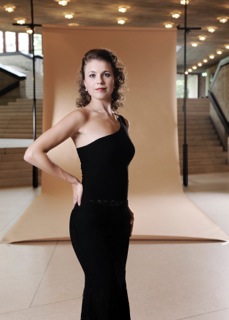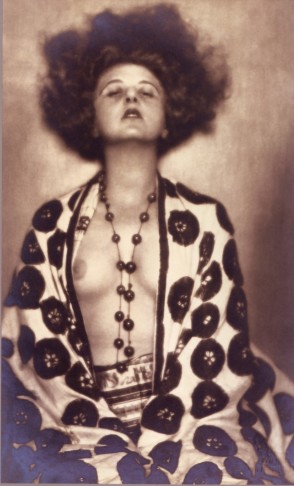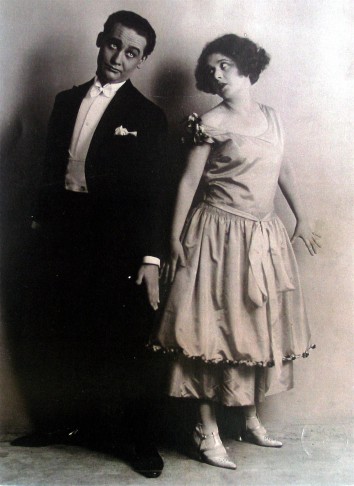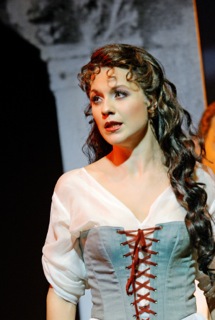Kevin Clarke
Operetta Research Center
3 February, 2015
Young and smart soprano Simone Riksman made quite a stir in the new production of Kálmán’s Gräfin Mariza in St. Gallen recently. We spoke to the Dutch singer about the image-problem operetta has in The Netherlands, on working with cabaret stars such as the Geschwister Pfister and on the special challenges of the genre. And, of course, about her plans after leaving St. Gallen at the end of this season.

Dutch soprano Simone Riksman. (Photo: S. Riksman)
You just scored a huge personal success as Countess Lisa in the St. Gallen production of Kálmán’s Gräfin Mariza. Is this your first professional encounter with operetta?
Through the years I have performed various types of operetta, beginning with French repertoire like Laurette in Le Docteur Miracle by Bizet and La Blanche Aline in Les Aventures du Roi Pausole from Honegger. Two seasons ago I sang Annina in Nacht in Venedig by Johann Strauss, directed by Cusch Jung. The production with Stefan Huber of Gräfin Mariza was my first piece by Kálmán. The music is extraordinarily colourful, charming, yet very passionate. It enables one to escape daily life for a little while, though at the same time the audience is able to identify with the characters, their hopes and struggles for that “little bit of happiness” everyone is seeking. As a performer, I sense there is a place in operetta for my spielfreude to come alive, the real pathos of feelings, but with the wink of an eye. I love it!

Elsie Altmann photographed by d’Ora in 1922. This image was used by “Die Stunde” to advertise the world premiere of “Gräfin Mariza” at the Theater an der Wien in 1924.
A week before the world premiere of Mariza in 1924, the Viennese newspaper Die Stunde published a topless photo of dancer Elsie Altmann, the first Lisa. Is it important for the role to be an attractive dancer – and a sexy one?
For me, sex appeal lies in elegance of movement, and the energy that radiates from a person, more than showing nakedness, being super thin, or pretending to be something. Sexiness lies in honesty, in chemistry on stage, in daring to look each other in the eye, and using the body as an instrument of expression. Sex or nudity has been used as a shocker many times. But now, in a time where we have “seen it all,” it becomes a distraction from the story and leads the attention to the performer as a private person. The opposite of what we want to achieve.
Do you feel there is anything such as “sex appeal” in operetta today?
When it comes to looks and so called sexiness people tend to forget the important role both a costume designer and the makeup department have. The lift one gets from a great outfit, hair and make up is undoubtedly of huge importance. It can also make an enormous difference to your movements and overall feeling on stage.
Your stage brother in Gräfin Mariza, Tassilo, is played by Tobias Bonn. He is not an opera singer, but comes from a different performance tradition. What was it like working with him?
It is very inspiring to work with Tobias Bonn. He is an astounding actor, a true performer and his voice has a quality of sound that is so beautiful. We have had many comments on our scene already in the rehearsal process. It just clicked, which makes it a great joy to work and perform together.
In the discussion about style of singing and performance traditions I am a believer in flexibility.
This role has different vocal requierements than Micaela in Carmen, or a delicate song by Poulenc. Where in the opera world sound is and often has to be the main carrier, here there is more emphasis on the text, and the timing in pronunciation is different. It is fun to play with that, not to say it is highly necessary. Without it, operetta loses its wit and understandability and could become overly sweet in expression. It makes it more interesting when these styles are allowed to influence each other.
Together with Christoph Marti, you had two “Kleinkunst” artists in the cast of Mariza. What did you think of Christoph Marti’s show-stopping cameo as the old aunt?
Christoph is one of a kind. His show-stopper shines its light on the rest of the evening. His character as ‘Deus ex machina’ is designed in this production to be the outstanding figure. The way he brings this character to life makes you reconsider the “art of performing” in general.

Max Hansen and Elsie Altman, in the original 1924 production of “Gräfin Mariza.” (Photo: ORCA)
Elsie Altman, back in 1924, had the phenomenal Max Hansen as her partner, playing Baron Koloman Zsupan. You have two partners as Zsupan: Riccardo Botta and Nik Kevin Koch. Judging by their photos, they are as different as can be. How does your portrayal of Lisa change when you play with one or the other?
Naturally, each person brings his or her own energy and personality along on stage. The reading of dialogues, timing of delivering jokes and musicality may and could only be different. It is the challenging and rewarding part of live-theatre to play with what happens that particular evening – and respond to it.
You are a light coloratura soprano. Many famous colleagues of yours, from the past, have had stellar careers in operetta: Adele Kern, Gitta Alpar, Hilde Güden, Erika Köth, Anneliese Rothenberger, Lucia Popp etc. Are you familiar with their recordings? Do you have any particular role models? Are there any songs or roles you would like to perform in the future?
You name the Ladies! (laughs) Their legacy is enormous, inspiring, and a guidance, whenever I research a new piece. Although I do not sing the coloratura fach, there are many operetta roles I would love to perform. This is an interesting time for operetta, and how it is being performed. Where with full orchestra one would need bigger voices for the leading roles, nowadays we have and take the options to arrange, size-down the orchestra or use micro-ports. This makes it very enticing.
The array of roles that come into reach, the flexibility one then can have, singing and dancing, as a performer is huge.
It is exactly what one needs to perform operetta well, in all its facets. I cannot wait to dive into it all!
Operetta in NL is a genre exclusively left to amateurs, which often gives it a very bad reputation. How did your Dutch friends react when they heard you were doing Gräfin Mariza? Is it something to brag about back home, or something you better hide if you want to be taken seriously as an artist?

Simone Riksman in “Eine Nacht in Venedig.” (Photo: Theater St. Gallen)
Operetta is maybe the most underestimated genre of today. You sometimes feel the need to excuse yourself for even liking it. The material can be looked upon as “simple.” Executing it properly, however, is as difficult as doing a proper Nozze di Figaro! Dialogues, dancing and singing are three very demanding elements in their own right. The challenge of combining them together is not everyone’s cup of tea. On top of that, the particular lightness in operetta is the hardest to achieve on stage. The fine line of timing, portraying naturalness and elegance, is an art of its own.
You are leaving St. Gallen soon, after five seasons. Are there any new operetta roles on the horizon for you? And is there anything you take away, for the future, from this Mariza experience with choreographer Danny Costello, director Stefan Huber and the Geschwister Pfister boys?
Working with a director as Stefan Huber on Mariza has been an immense privilege, which I hope to experience again in the future. It has been an intense and wonderful production time, resulting in a show everyone loves performing and where the audience gets a chance to escape the real world for a little while. Danny Costello is expression from head to toe. He shows how every part of the body can tell a story and revived my love for tap dance and modern ballet. And the Geschwister Pfister? The feeling it gives, when it clicks. It’s hard to put in words. It’s one of the main reasons I love my job.
